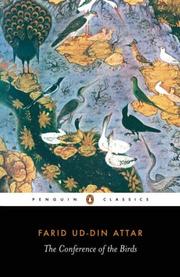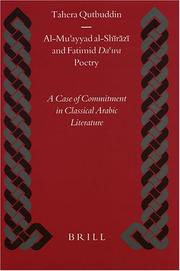| Listing 1 - 10 of 13 | << page >> |
Sort by
|
Book
ISBN: 9783956509087 3956509080 Year: 2022 Publisher: Beirut Baden-Baden Orient-Institut Beirut ; Ergon Verlag in Kommission
Abstract | Keywords | Export | Availability | Bookmark
 Loading...
Loading...Choose an application
- Reference Manager
- EndNote
- RefWorks (Direct export to RefWorks)
Wine --- Islamic poetry --- Islamic poetry, Arabic --- History and criticism
Book
ISBN: 9004661409 Year: 1983 Publisher: Leiden : BRILL,
Abstract | Keywords | Export | Availability | Bookmark
 Loading...
Loading...Choose an application
- Reference Manager
- EndNote
- RefWorks (Direct export to RefWorks)
Islamic poetry, Fula --- Islamic poetry, Fula --- Translations into French.
Book
ISBN: 9780300248616 030024861X 9780300225815 Year: 2018 Publisher: New Haven, Conn. Yale University Press
Abstract | Keywords | Export | Availability | Bookmark
 Loading...
Loading...Choose an application
- Reference Manager
- EndNote
- RefWorks (Direct export to RefWorks)
"This stunning collection showcases the love poetry and mystical teachings at the heart of the Islamic tradition in accurate and poetic original translations. At a time when the association of Islam with violence dominates headlines, this beautiful collection offers us a chance to see a radically different face of the Islamic tradition. It traces a soaring, poetic, popular tradition that celebrates love for both humanity and the Divine as the ultimate path leading humanity back to God. Safi brings together for the first time the passages of the Qur'an sought by the Muslim sages, the mystical sayings of the Prophet, and the teachings of the path of "Divine love." Accurately and sensitively translated by leading scholar of Islam Omid Safi, the writings of Jalal al-Din Balkhi (Rumi) can now be read alongside passages by Kharaqani, 'Attar, Hafez of Shiraz, Abu Sa'id-e Abi 'l-Khayr, and other key Muslim mystics. For the millions of readers whose lives have been touched by Rumi's poetry, here is a chance to see the Arabic and Persian traditions that produced him."--Amazon.
Islamic poetry, Arabic --- Islamic poetry, Persian --- Translations into English --- Islam
Book
Year: 2018 Publisher: Project Gutenberg
Abstract | Keywords | Export | Availability | Bookmark
 Loading...
Loading...Choose an application
- Reference Manager
- EndNote
- RefWorks (Direct export to RefWorks)
Book
ISBN: 9004401830 Year: 2019 Publisher: Leiden; Boston : BRILL,
Abstract | Keywords | Export | Availability | Bookmark
 Loading...
Loading...Choose an application
- Reference Manager
- EndNote
- RefWorks (Direct export to RefWorks)
Regarded by many as the last great mystical poet of medieval Persia, ʿAbd al-Raḥmān Jāmī (d. 898/1492) spent the greater part of his life in Herat. As a student, he excelled in every subject he engaged in and appeared destined for an academic career. But then, in his early thirties, he went through a spiritual crisis that ended in him joining the Herat branch of the mystical Naqshbandiyya order, led by the charismatic Saʿd al-Dīn Kāshgharī (d. 860/1456). A protégé of three successive Timurid rulers in Herat, Jāmī's wide network of friendships and relations extended from spiritual and literary circles through the political to the academic. With 39.000 lines of verse and over 30 prose works to his name, Jāmī's literary production is quite overwhelming. The present volume, containing 433 of his letters and messages, bears witness to his great yet modest personality, his social engagement, and the expanse and variety of his network.
Book
ISBN: 9004069143 Year: 1983 Publisher: Leiden Brill
Abstract | Keywords | Export | Availability | Bookmark
 Loading...
Loading...Choose an application
- Reference Manager
- EndNote
- RefWorks (Direct export to RefWorks)
Islamic poetry, Fula --- Islamic poetry, Fula --- Translations into French --- Maroua (Cameroon) --- Religious life and customs.
Book
ISBN: 9004365958 9004362886 9789004365957 9789004362888 Year: 2018 Publisher: Leiden Boston
Abstract | Keywords | Export | Availability | Bookmark
 Loading...
Loading...Choose an application
- Reference Manager
- EndNote
- RefWorks (Direct export to RefWorks)
This book presents fifty-one didactic and devotional Sufi poems (with English translations) composed by the ulama of Brava, on Somalia’s Benadir coast, in Chimiini, a Bantu language related to Swahili and unique to the town. Because the six ulama-poets, among whom two women, guided local believers towards correct beliefs and behaviours in reference to specific authoritative religious texts, the poems allow insight into their authors’ religious education, affiliations, in which the Qādiriyyah and Aḥmadiyyah took pride of place, and regional connections. Because the poems refer to local people, places, events, and livelihoods, they also bring into view the uniquely local dimension of Islam in this small East African port city in this time-period.
Sufi poetry. --- Mwini dialect. --- Af-Chimwiini dialect --- Barwaani dialect --- Bravanese dialect --- Chimwiini dialect --- Mwiini dialect --- Swahili language --- Sufism --- Islamic poetry --- Religious poetry --- Sufi literature --- Baraawe (Somalia) --- Brava (Somalia)
Book
ISBN: 9004405046 Year: 2019 Publisher: Leiden; Boston : BRILL,
Abstract | Keywords | Export | Availability | Bookmark
 Loading...
Loading...Choose an application
- Reference Manager
- EndNote
- RefWorks (Direct export to RefWorks)
In his Meccan days Muḥammad's message was rejected by many as a threat to the values and interests of the community. Among his opponents, there was a merchant called Naḍr b. Ḥārith. From his visits to the city of Ḥīra in Mesopotamia, a cultural melting-pot of Iranian, Christian, and pagan Arab beliefs and traditions, he had brought back stories from Iranian folklore, especially about Rustam and Isfandyār, with which he tried to attract the attention of those listening to Muḥammad's speeches, away from the latter's revolutionary message. This explains why the religious elite of the Persianate world rejected Iranian epic folklore as contrary to the message of Shīʿī Islam, Rustam in particular being viewed as incompatibele with the person of Imam ʿAlī. But folklore being difficult to eradicate, Rustam was often depicted as a Muslim convert and enemy-turned-friend of ʿAlī, like in this poem from Safavid times. A miracle story involving ʿAlī accompanies it.
Rustam (Legendary character) --- Islamic poetry, Persian. --- Epic poetry, Persian. --- Persian poetry --- History and criticism. --- ʻAlī ibn Abī Ṭālib, --- Miracles

ISBN: 0140444343 9780140444346 Year: 1984 Publisher: Harmondsworth, Middlesex, England ; New York (N.Y.) : Penguin Books,
Abstract | Keywords | Export | Availability | Bookmark
 Loading...
Loading...Choose an application
- Reference Manager
- EndNote
- RefWorks (Direct export to RefWorks)
An allegorical poem about the search of the world's birds for the perfect king illustrates the mystical beliefs of sufism. This 12th century century Sufic poem explores the nature of the spiritual path through an allegory of birds that go in search of a king, which represents the seeker as he travels towards enlightenment.
Sufi poetry. --- Sufi poetry, Persian. --- Sufism --- Sufism. --- Sufi poetry --- Sufi poetry, Persian --- Persian Sufi poetry --- Persian poetry --- Islamic poetry --- Sufi literature --- Early works to 1800 --- Mystik. --- Poetry in Persian, 1000-1389 - English texts. --- ʻAṭṭār, Farīd-ad-Dīn, --- ʻAṭṭār, Farīd-ad-Dīn. --- Iran (Altertum).

ISBN: 9004141030 9786610867172 9047406362 1280867175 1433704161 9789047406365 9781433704161 9789004141032 Year: 2005 Volume: v. 57 Publisher: Leiden Boston Brill
Abstract | Keywords | Export | Availability | Bookmark
 Loading...
Loading...Choose an application
- Reference Manager
- EndNote
- RefWorks (Direct export to RefWorks)
This study analyzes the committed religio-political poetry of al-Mu'ayyad al-Shirazi, chief missionary for the Fatimids in the fifth/eleventh century, demonstrating his founding of the tradition of ''Fatimid da'wa (religious mission) poetry" that has flourished after him for a thousand years.
Islamic poetry, Arabic --- History and criticism. --- Muʼayyad fī al-Dīn Hibat Allāh ibn Mūsá, --- Criticism and interpretation. --- Poetry, Arabic --- Poésie arabe --- Histoire et critique --- Muʼayyad fī al-Dīn Hibat Allāh ibn Mūsá, --- History and criticism --- Hibat Allāh ibn Mūsá, Muʼayyad fī al-Dīn, --- Ibn Mūsá, Muʼayyad fī al-Dīn Hibat Allāh, --- Muʼayyad fī al-Dīn Hibat Allāh Mūsá al-Shīrāzī, --- Shīrāzī, Muʼayyad fī al-Dīn Hibat Allāh Mūsá, --- مؤيد في الدين هبة الله بن موس، --- مؤيد في الدين هبة الله بن موسى --- مؤيد في الدين هبة الله بن موسى، --- Islamic poetry [Arabic ] --- Muayyad fi al-Din Hibat Allah ibn Musa,
| Listing 1 - 10 of 13 | << page >> |
Sort by
|

 Search
Search Feedback
Feedback About UniCat
About UniCat  Help
Help News
News